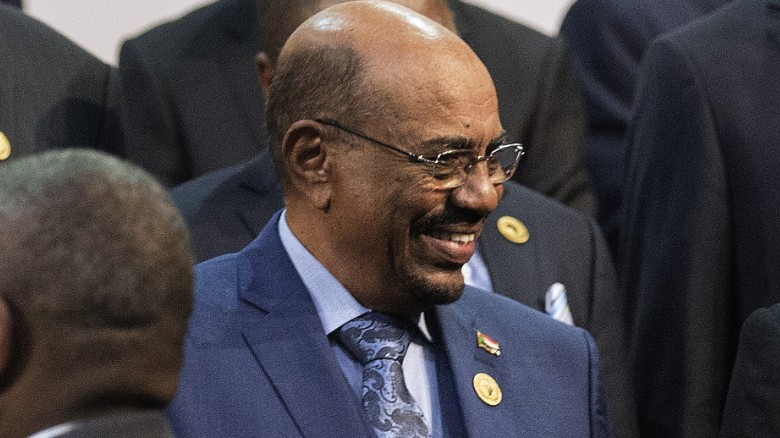Sudan's leader leaves South Africa before court orders arrest
CNN)—Sudanese President Omar al-Bashir, a man accused of war crimes and genocide, has left South Africa one step ahead of the law. Al-Bashir left the country Monday just as a South African High Court decided to order his arrest. The human rights group that had petitioned the court to order al-Bashir's arrest, the Southern Africa Litigation Centre, said in a statement it was disappointed that the government allowed the Sudanese President to leave before the ruling. Judge Hans Fabricius had ruled Sunday that al-Bashir had to stay in South Africa while a court considered whether he should be arrested. The judge also ordered all ports in the country to prevent the Sudanese leader from leaving. But lawyers arguing in court for al-Bashir's arrest warned, in advance, that the ports of entry and exit were not obeying the judge's order. "Being an organisation committed to the rule of law, SALC is encouraged by the Court's order and the independence of the judicial process," said Kaajal Ramjathan-Keogh, the group's director. "The rule of law, however, is only as strong as the government which enforces it. Home Affairs have allowed a fugitive from justice to slip through its fingers, compounding the suffering of the victims of these grave crimes." Al-Bashir's departure was confirmed by the South African and Sudanese governments. Sudan's state news agency, SUNA, reported that Sudanese Foreign Minister Ibrahim Ghandour would hold a news conference at the airport Monday evening "following return of the President of the Republic." It is unclear in light of the judge's order what help al-Bashir might have received, and from whom. His plane had been relocated earlier from Tambo International Airport, near Johannesburg, to Waterkloof military base, south of Pretoria. And sometime after that, the alleged war criminal went to the military base and slipped through the net. Court proceedings were underway His departure came as the North Gauteng High Court in Pretoria was considering a request by the International Criminal Court to arrest him on charges of war crimes, crimes against humanity and genocide. The ICC charges against al-Bashir stem from the conflict in the Darfur region in western Sudan, which began in 2003. The government of Sudan has been accused of repression and ethnic cleansing of Darfur's non-Arab population. Al-Bashir had been in South Africa attending a two-day summit of African Union leaders. Fabricius, the judge, said Sunday that he wanted to determine whether it was legally acceptable for Pretoria to allow al-Bashir to visit South Africa without arresting him -- and key in that decision would be determining if the South African Cabinet's decision not to comply with the ICC demand could trump an international treaty, South Africa's Mail & Guardian newspaper reported. U.N. official: South Africa must comply with treaty Report: Sudanese soldiers rape more than 200 women 02:56 PLAY VIDEO Earlier Monday, when al-Bashir's whereabouts were still unclear, the chairman of South Africa's Portfolio Committee on International Relations and Cooperation, Siphosezwe Masango, said he was concerned about the Sudanese President's possible arrest. "This is an opportunistic act only meant to pit African leaders against each other in the name of international law," Masango said in a statement. He urged the leaders gathered for the summit to concentrate instead on regional trade, xenophobia and the development of Africa's infrastructure. He said the ICC appeared to target African leaders and, if the trend continued, his committee might have to recommend that the government re-examine South Africa's membership in the international court. Obama, Blair etc are mass murderers & got away with it, why should we hold Zuma & his govt accountable for Marikana? #Bashir — Max du Preez (@MaxduPreez) June 15, 2015 But the U.N.'s high commissioner for human rights, Zeid Ra'ad Al Hussein, warned that member states had to follow ICC rules. "It is of deep concern to me and my office when court orders are issued by the ICC in respect of the serving head of state of Sudan, and state parties to the Rome Statute openly flout them," he said Monday at a meeting of the Human Rights Council in Geneva, Switzerland. The Rome Statute was a treaty that established the International Criminal Court. "In this regard, we await the ruling of the Pretoria High Court this morning, as it assesses the request submitted by the ICC," he said. Sidiki Kaba, the Senegalese justice minister who serves as president of the assembly of states parties to the Rome Statute, expressed his "deep concern about the negative consequences for the court in case of nonexecution of the warrants by States Parties and, in this regard, urges them to respect their obligations to cooperate with the Court." South Africa, Kaba said in a statement, should "spare no effort" to arrest al-Bashir. South Africa had twice before threatened to arrest al-Bashir -- in 2009 before President Jacob Zuma's inauguration and in 2010 before the World Cup, according to the Southern Africa Litigation Centre. He attended neither event, according to news reports. Immunity for heads of state on official business doesn't apply to the ICC; SA must #ArrestBashir. #AUSummit http://t.co/zIxdTW1HYm — ISS (@issafrica) June 14, 2015 Devastation in Darfur Arrest warrants from 2009 and 2010 outline the case against al-Bashir and allege that during the Darfur conflict he ordered the military, police and Janjaweed militia to attack three ethnic groups deemed sympathetic to rebel outfits with "the specific intent to destroy in part" those groups. As part of that campaign, the warrants say, the Sudanese President ordered the rape, murder and torture of civilians and the razing of villages. The United Nations has estimated that as many as 300,000 people have been killed in the Darfur conflict since 2003, a tally the Sudanese government says is inflated. Another 7 million are in need of humanitarian assistance, the U.N. High Commissioner for Refugees estimates. News Courtesy: www.cnn.com











